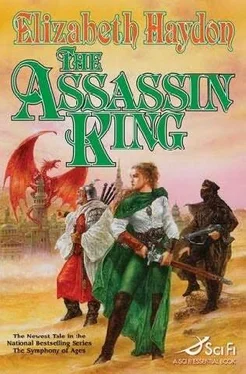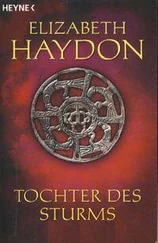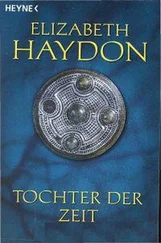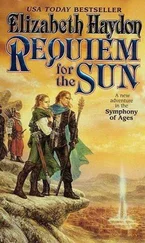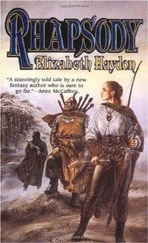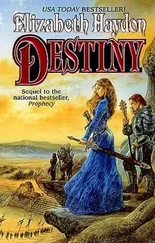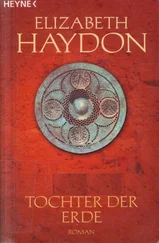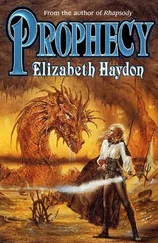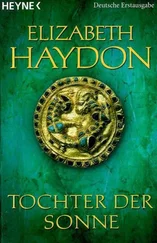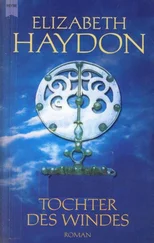Elizabeth Haydon - The Assassin King
Здесь есть возможность читать онлайн «Elizabeth Haydon - The Assassin King» весь текст электронной книги совершенно бесплатно (целиком полную версию без сокращений). В некоторых случаях можно слушать аудио, скачать через торрент в формате fb2 и присутствует краткое содержание. Год выпуска: 2005, Жанр: Фэнтези, на английском языке. Описание произведения, (предисловие) а так же отзывы посетителей доступны на портале библиотеки ЛибКат.
- Название:The Assassin King
- Автор:
- Жанр:
- Год:2005
- ISBN:нет данных
- Рейтинг книги:3 / 5. Голосов: 1
-
Избранное:Добавить в избранное
- Отзывы:
-
Ваша оценка:
- 60
- 1
- 2
- 3
- 4
- 5
The Assassin King: краткое содержание, описание и аннотация
Предлагаем к чтению аннотацию, описание, краткое содержание или предисловие (зависит от того, что написал сам автор книги «The Assassin King»). Если вы не нашли необходимую информацию о книге — напишите в комментариях, мы постараемся отыскать её.
The Assassin King — читать онлайн бесплатно полную книгу (весь текст) целиком
Ниже представлен текст книги, разбитый по страницам. Система сохранения места последней прочитанной страницы, позволяет с удобством читать онлайн бесплатно книгу «The Assassin King», без необходимости каждый раз заново искать на чём Вы остановились. Поставьте закладку, и сможете в любой момент перейти на страницу, на которой закончили чтение.
Интервал:
Закладка:
Elizabeth Haydon
The Assassin King
Ode
We are the music-makers,
And we are the dreamers of dreams,
Wandering by lone sea-breakers,
And sitting by desolate streams;
World-losers and world-forsakers,
On whom the pale moon gleams:
Yet we are the movers and shakers
Of the world for ever, it seems.
With wonderful deathless ditties
We build up the world’s great cities,
And out of a fabulous story
We fashion an empire’s glory:
One man with a dream, at pleasure,
Shall go forth and conquer a crown;
And three with a new song’s measure
Can trample an empire down.
We, in the ages lying
In the buried past of the earth,
Built Nineveh with our sighing,
And Babel itself with our mirth;
And o’erthrew them with prophesying
To the old of the new world’s worth;
For each age is a dream that is dying,
Or one that is coming to birth.
The Poem of Seven
Seven Gifts of the Creator,
Seven colors of light,
Seven seas in the wide world,
Seven days in a sennight,
Seven months of fallow,
Seven continents trod, weave
Seven eras of history
In the eye of God.
Song of the Sky Loom
Oh, our Mother the Earth;
Oh, our Father the Sky,
Your children are we,
With tired backs.
We bring you the gifts you love.
Then weave for us a garment of brightness——
May the warp be the white light of morning,
May the weft be the red light of evening,
May the fringes be the fallen rain,
May the border be the standing rainbow.
Thus weave for us a garment of brightness
That we may walk fittingly where birds sing;
That we may walk fittingly where the grass is green.
Oh, our Mother Earth;
Oh, our Father Sky.
The Weaver’s Lament
Time, it is a tapestry
Threads that weave it number three
These be known, from first to last,
Future, Present, and the Past.
Present, Future, weft-thread be
Fleeting in inconstancy
Yet the colors they do add
Serve to make the heart be glad.
Past, the warp-thread that it be,
Sets the path of history
Every moment ’neath the sun
Every battle, lost or won,
Finds its place within the lee
Of Time’s enduring memory.
Fate, the weaver of the bands,
Holds these threads within Her hands,
Plaits a rope that in its use
Can be a lifeline, net—or noose
1
On a morning of unsurpassed fineness, the sun rose over an incandescent sea, rippling with light so bright as to be painful in its radiance. The winter wind dancing over the gleaming waves, fresh with the sweet hint of a spring coming far away in the southlands, carried with it the scent of blood. Rath cursed and lowered his head to his chest, pulling bis brown hood farther down over his stinging eyes. He waited for the water beneath his translucent eyelids to clear, then blinked several times and looked up again at the shoreline. The sea was so calm that the edge of the land barely wavered in the distance. Rath clutched the oar in his sinewy hands and put his back into rowing for the beach. With each stroke, each pull, each screech of wood against the oarlock of his small boat, he canted his list of targets, every one of their names engraved permanently on his memory’. Hrarfa, Fraax, Sistha, Hnaf, Ficken, he whispered in the odd, buzzlike language of his ancient race, the one form of speech that was inaudible to the wind. Rath was always careful not to put information on the wind, especially the sea wind, where it would blow recklessly about the wide world, to be heard by any ear that knew how to listen. Rath was well aware of the loose tongue of the wind; he had been born of that ephemeral element. He gritted his teeth as he rowed, mentally cursing the waves over which he traveled. Water had long blocked his Seeking vibration and kept him from his quarry. Each stroke moved him closer to being free of it, but that did little to calm his growing ire. Until he was away from the sea and the cacophony of thick vibrations that it generated, he would be unable to hunt. So he concentrated, as always, on his list. Hrarfa, Fraax, Sistha, Hnaf, Ficken. Once through the roster of would-be victims that had been his agenda for as long as he could recall, he silently intoned one last name that had been recently added. Ysk. It was not a name in the language of the others, but rather one that had been conferred on its owner by an ignorant species, a demi-human race that barely formed words at all. Ysk was the Firbolg word for spittle, for the regurgitation of something foul. That monsters had given someone such a title could only convey the deepest disgust, contempt that had no limit. It was perhaps the worst name that Rath had ever heard. It was also a dead name, a name whose power had been broken more than a millennium before, whose history lay at the bottom of the sea on the other side of the world. A name all but forgotten, indeed, completely erased from the wind and from memory, except for the recollection of Rath and his kind. It was the last name on his list, but the first one he would actively seek upon landing. When the beach was finally close enough that rowing was disproportionate effort, Rath climbed out of the boat and left it drifting in the tide. He had sighted his landing carefully so as to be able to come ashore unnoticed in a small, rocky alcove be-tween two fishing villages. His luck was holding; there was no one in sight for as far up and down the beach as he could see. He turned away from the sea wind with one last glance over his shoulder; the little boat was slowly backing away in a graceless dance, spinning aimlessly in the current. Rath waded to shore, ignoring the pebbles and seaweed that coated the sand beneath his feet. His soles had no nerves in them anyway, the calluses from millennia of walking through fire were almost as thick as a boot would have been. Once on the beach, he hurried forward until the scrambling froth of the waves was no longer able to reach him, then stopped in the cold, dry sand, pulled back his hood, and tilted his head to the southwest, listening to the wind. He waited for the span of a hundred heartbeats, but no voices akin to his own could be heard; none of his fellow hunters had anything to report, as was the case most of the time. As it had been for centuries into millennia. Rath lingered a moment longer, then turned his back to the west, away from the crashing of the waves and the rustling of the foam. He took a breath of the salt wind, inhaling over the four openings of his windpipe, clenched his teeth, and loosed his kirai, the Seeking vibration by which his race sought then-prey. The buzzing sound came forth from the deepest opening in his throat, a vibration heard only by him. Then he opened his mouth, allowing the air that was rising from within his lungs to pass over the top opening in his throat, forming words again. Hrarfa, Fraax, Sistha, Hnaf, Ficken. One by one he canted the names of the demon spirits he was hunting, feeling the slight variation in tone as he changed from one name to another. If the kirai matched any of those names to a vibration it detected in the air, his throat would burn as if with caustic fire; he would taste the beast’s blood in his mouth, feel its heartbeat in his own chest. He could lock on to that rhythm and follow it. But, as always, there was no taste of any of the names on the wind. Finally, he intoned the last name. Ysk. This name, of course, was different. Unlike the others, it was the dead name of a living being, a name once given, in another lifetime, to a man with a soul.
Читать дальшеИнтервал:
Закладка:
Похожие книги на «The Assassin King»
Представляем Вашему вниманию похожие книги на «The Assassin King» списком для выбора. Мы отобрали схожую по названию и смыслу литературу в надежде предоставить читателям больше вариантов отыскать новые, интересные, ещё непрочитанные произведения.
Обсуждение, отзывы о книге «The Assassin King» и просто собственные мнения читателей. Оставьте ваши комментарии, напишите, что Вы думаете о произведении, его смысле или главных героях. Укажите что конкретно понравилось, а что нет, и почему Вы так считаете.
